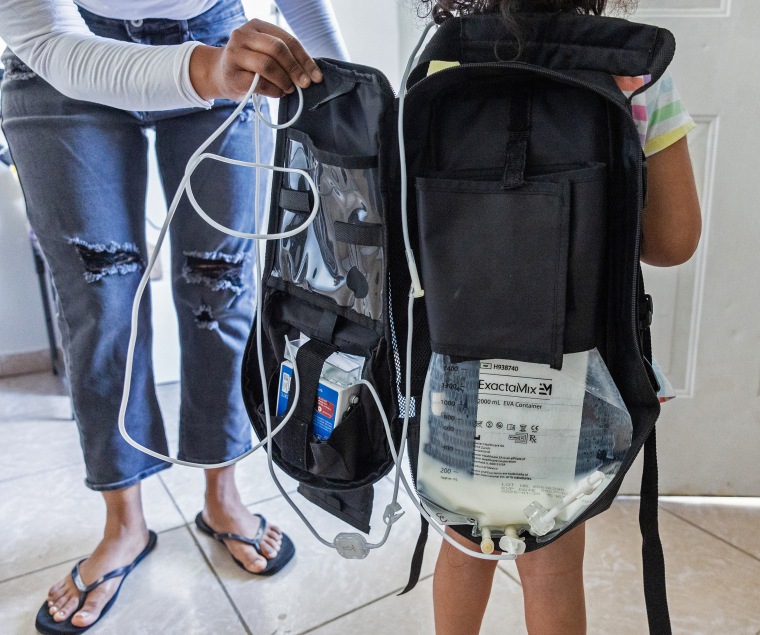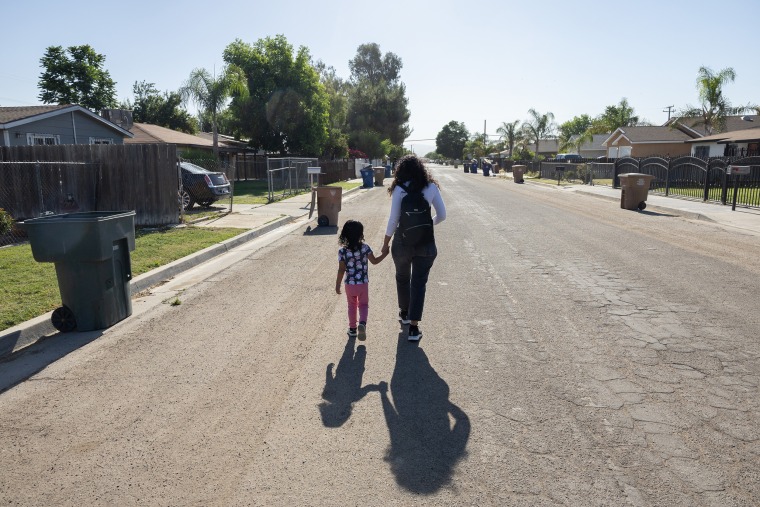Share this @internewscast.com
A young girl from Mexico might lose her crucial medical treatment in Los Angeles due to the unexpected termination of her family’s legal immigration status.
Her family is now fighting to have their status reinstated.
“If we are deported, and my daughter is stripped of her essential treatment, she won’t survive,” stated Deysi Vargas, the girl’s mother, speaking in Spanish at a press briefing.
Her 4-year-old daughter, identified only by the initials S.G.V., suffers from short bowel syndrome, a condition that prevents her small intestines from properly absorbing nutrients from food.
Instead, the girl receives all the nutrients she needs intravenously through a treatment known as Total Parenteral Nutrition, or TPN.
“The doctors that are treating her have stated very clearly that if her treatment is interrupted, she will die within days,” Gina Amato, an attorney for the family, told NBC News. “This is a classic example where deportation would equal death for this child. It is a very desperate situation.”
To prevent malnutrition, S.G.V. receives her TPN treatment each night at home for at least 14 hours, the mother and her attorneys said.
During the day, when the girl goes to pre-school or accompanies her mother to the supermarket, S.G.V. wears a portable version of the treatment in a backpack.
At least four times a day, Vargas spends one hour connecting her daughter to gastric tubes that attach to the backpack containing the nutrients she needs.

The company that manufactures the equipment that delivers the intravenous nutrition the girl needs does “not allow the equipment to travel outside the United States,” Amato said at the news conference, adding that few places outside the U.S. can safely and effectively administer this treatment.
Before coming to the United States nearly two years ago, S.G.V. “was in really terrible shape and was having a very difficult time surviving,” Amato said.
The girl had been receiving medical care in Mexico, spending many hours in a hospital bed receiving her nutrients intravenously, according to Amato and Vargas.
S.G.V. was “not growing or getting any better,” Vargas said.
Desperate to get better medical care for their daughter, Vargas and her partner used the now-defunct CBP One app on July 2023 to legally enter the U.S. through the southern border. The family was then granted humanitarian parole for the purpose of seeking medical treatment for S.G.V.
The girl was quickly taken to a hospital in San Diego upon their arrival because she was in such poor health, the family and their attorneys said. A year later, she was referred to the Children’s Hospital in Los Angeles, which has one of the nation’s best gastroenterology programs.
Doctors there have been caring for S.G.V. for the past year, also monitoring the TPN treatment she receives.
“Now, with the help my daughter receives in the United States, my daughter has the opportunity to leave the hospital, see the world, and live like a child her age,” Vargas said.
S.G.V. was at the news conference with her TPN backpack. She spent most of the time playing cards and making some arts and crafts to show how the treatment has helped improve her quality of life.
According to the family’s legal team, the family’s humanitarian parole was set to expire at the end of July and Vargas was fighting to get it extended.

But last month, the family received a notice via email from the Department of Homeland Security terminating their parole and work authorization.
“If you do not depart the United States immediately you will be subject to potential law enforcement actions that will result in your removal from the United States — unless you have otherwise obtained a lawful basis to remain here,” the notice, which was obtained by NBC News, reads.
“Clearly they did not give individualized consideration to this case, because had they done so,” Amato told NBC News, “we believe that they would not have made this decision given the really poor condition of this child.”
The notice also said, “DHS encourages you to leave immediately on your own,” using the CBP Home mobile app, which has a self-deportation feature.
The notice did not state a reason for revoking the family’s parole other than DHS “exercising its discretion.”
According to attorneys at Public Counsel, the legal firm representing the family, no one in the family has any convictions. But the girl’s father, who is not married to Vargas, has a pending charge stemming from “a misunderstanding at the San Diego hospital when he raised his voice” when discussing his daughter’s care in an area “where he did not understand he could not be loud.”
Attorneys believe the charge will likely “be dismissed because he’s complying with the anger management classes the courts requested of him,” they said. “This does not influence the legality of Deysi’s case.”
Believing the DHS notice was perhaps sent by mistake, attorneys for the family wrote a letter to federal immigration authorities on May 9.
“They have not violated the terms of their parole,” the letter, which was obtained by NBC News, reads. “We believe this notice was issued in error. Please correct this error.”
Still, the family continued receiving notices about their parole’s termination, Amato said during the press conference. So, they filed a new application for humanitarian parole through the U.S. Citizenship and Immigration Services.
The agency did not respond to a request for comment.
A senior DHS official insisted to NBC News via email that reports about the family “actively being deported are FALSE. This family applied with USCIS for humanitarian parole on May 14, 2025, and the application is still being considered.”
In the meantime, “the family is very much in limbo, and they’re terrified,” Amato said. “They’re no longer in status and they’re no longer authorized to work in the U.S. So, they face many fears.”











